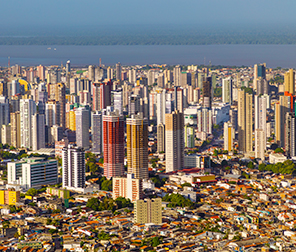On July 9, US President Donald Trump set his sights on Brazil, threatening to impose a steep 50% tariff on US imports from the country—five times the 10% levy introduced in April. The new tariffs are scheduled to take effect on August 1.
Markets initially recoiled: the Ibovespa Index dropped 1%, local rates fell by 25 basis points and the Brazilian real weakened by 1.5%. However, markets have since stabilized, reflecting a growing perception that—even if the tariffs remain in place—the impact on Brazil’s growth and inflation will be modest. Of course, the situation remains fluid, and further market moves will depend on how events unfold. In the absence of immediate retaliatory measures from Brazil (our base case), we expect volatility to subside from the initial spike.
From a macroeconomic perspective, Trump’s move appears to be more bark than bite. Brazil’s trade balance with the US is nearly even, and most of its $40 billion in annual exports to America are commodities—oil (20%), coffee, meat, wood and petrochemicals (another 20%). These goods are largely inelastic to tariffs, meaning demand is unlikely to shift significantly. The real casualties are likely to be steel (already subject to tariffs) and aircraft (6.5% of exports), which could take a hit. Even so, the overall impact on Brazil’s economy should remain limited.
The true motivation behind Trump’s tariff threat appears to be political rather than economic. The timing coincides with the Trump administration’s efforts to pressure Brazil’s Supreme Court as it prosecutes former President Bolsonaro for his alleged coup attempt. Ironically, this heavy-handed approach may backfire—handing President Lula a convenient external adversary and potentially boosting his re-election prospects. Meanwhile, the Supreme Court is likely to close ranks and expedite its ruling on Bolsonaro, making a conviction more likely.
Tensions have also been heightened by a recent Supreme Court decision in Brazil that holds tech giants like Google and TikTok liable for user content—a hot-button issue that pits “freedom of expression” (the rallying cry of big tech and Bolsonaro’s allies) against the Lula administration’s campaign against “fake news.” While not the main trigger for Trump’s move, it certainly added fuel to the fire.
In response, Brazil’s government has prepared three possible retaliatory measures:
- Imposing reciprocal tariffs
- Taxing intellectual property rights (as permitted by the WTO) and
- Establishing new tariffs on environmental grounds
In short, our view is that Trump’s tariff gambit is more about political theater than economic substance—and it may end up strengthening Lula’s hand rather than weakening it.



